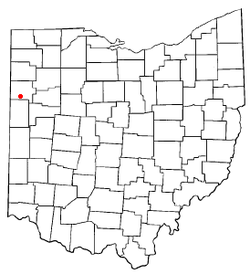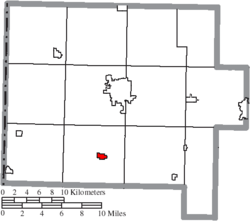2010 census
As of the census [6] of 2010, there were 705 people, 287 households, and 198 families residing in the village. The population density was 1,330.2 inhabitants per square mile (513.6/km2). There were 338 housing units at an average density of 637.7 per square mile (246.2/km2). The racial makeup of the village was 97.4% White, 0.3% Native American, 0.1% Asian, 1.3% from other races, and 0.9% from two or more races. Hispanic or Latino of any race were 3.8% of the population.
There were 287 households, of which 31.0% had children under the age of 18 living with them, 57.1% were married couples living together, 7.7% had a female householder with no husband present, 4.2% had a male householder with no wife present, and 31.0% were non-families. 27.9% of all households were made up of individuals, and 13.5% had someone living alone who was 65 years of age or older. The average household size was 2.46 and the average family size was 3.01.
The median age in the village was 40.1 years. 24.4% of residents were under the age of 18; 7.1% were between the ages of 18 and 24; 26.1% were from 25 to 44; 28.7% were from 45 to 64; and 13.6% were 65 years of age or older. The gender makeup of the village was 48.9% male and 51.1% female.
2000 census
As of the census [3] of 2000, there were 784 people, 312 households, and 218 families residing in the village. The population density was 1,706.0 inhabitants per square mile (658.7/km2). There were 329 housing units at an average density of 715.9 per square mile (276.4/km2). The racial makeup of the village was 97.32% White, 0.13% African American, 0.13% Asian, 1.15% from other races, and 1.28% from two or more races. Hispanic or Latino of any race were 1.91% of the population.
There were 312 households, out of which 36.2% had children under the age of 18 living with them, 57.7% were married couples living together, 9.0% had a female householder with no husband present, and 30.1% were non-families. 25.6% of all households were made up of individuals, and 12.2% had someone living alone who was 65 years of age or older. The average household size was 2.51 and the average family size was 3.00.
In the village, the population was spread out, with 26.7% under the age of 18, 11.4% from 18 to 24, 28.7% from 25 to 44, 20.7% from 45 to 64, and 12.6% who were 65 years of age or older. The median age was 36 years. For every 100 females there were 98.5 males. For every 100 females age 18 and over, there were 96.9 males.
The median income for a household in the village was $37,500, and the median income for a family was $42,734. Males had a median income of $29,526 versus $23,125 for females. The per capita income for the village was $16,304. About 1.7% of families and 3.6% of the population were below the poverty line, including 1.4% of those under age 18 and 1.2% of those age 65 or over.



